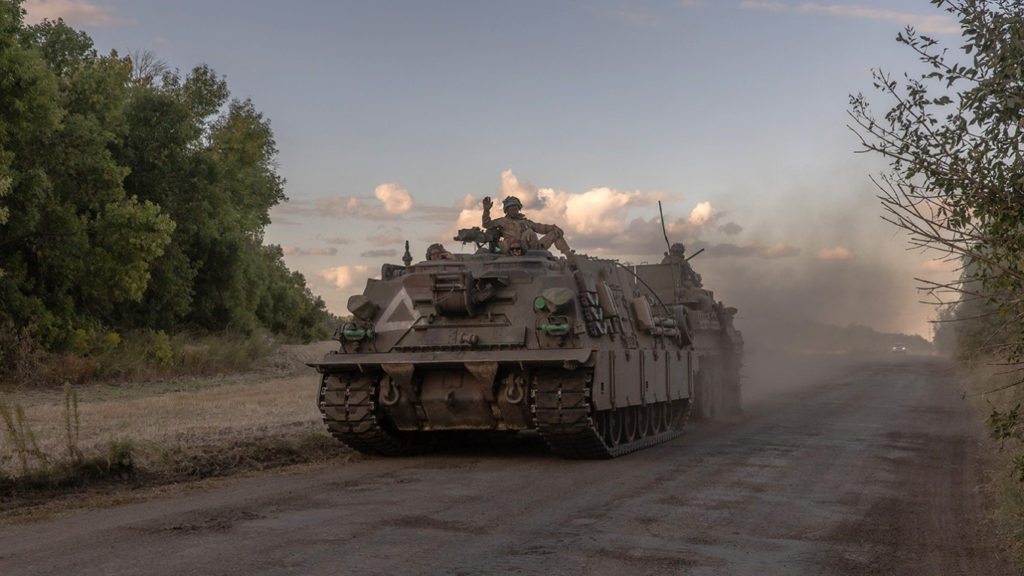The recent Ukrainian military operation in the Kursk region, confirmed by President Volodymyr Zelenskyy, has become a significant stage in the full-scale Russian-Ukrainian war, which has been going on for three years. This step has underlined the commitment of Kyiv not only to defend its borders and citizens, but also to strike at Russian aggressor directly on its territory. Ukrainian forces have taken control of about 1,000 square kilometers of the Kursk region, which was a response to more than 2,000 Russian strikes carried out on Ukraine from this territory since the beginning of the summer of 2024. The military operation demonstrated Ukraine’s ability to firmly and effectively confront the aggressor, including on its own soil, which is important in the context of the country’s overall defense strategy.
On August 12, 2024, Russian President Vladimir Putin held a meeting on the situation in the regions bordering Ukraine — Belgorod, Bryansk, and Kursk. The meeting was attended by members of the Russian Security Council, government representatives, heads of law enforcement agencies, and leaders of border regions with Ukraine.
Putin commented on the current situation in the Kursk region, noting the need for the Russian military to “squeeze out, drive the enemy out of our territories” and, together with the border service, ensure reliable cover of the state border. Such statements reflect growing concerns within the Russian leadership. The Kremlin is facing serious challenges, including the evacuation of citizens from the combat zone, which aggravates the internal situation in Russia and undermines trust in the government.
Last week, Putin also made several statements regarding the military actions on Russian territory. He called it a “large-scale provocation” and promised one-time payments of 10-15 thousand rubles for those evacuated from the combat zone. In recent years, the Kremlin, including Putin himself, has often considered events in border regions as something similar to natural disasters, which requires a small compensation for evacuated residents, as maximum. However, given the growing number of evacuees, which is about 200 thousand people, it is difficult to continue to consider the situation as natural disasters. It is quite possible that similar measures will soon have to be taken in the Bryansk and Belgorod regions. Meanwhile, evacuees from border areas are faced with poor conditions in temporary accommodation centers, which causes growing disappointment with the authorities. At the same time, the Russian army continues to die, “liberating” new settlements in the Ukrainian Donbas; budget funds are spent on the restoration of the self-proclaimed “DPR/LPR” republics. This money often ends up in the pockets of local “appointees” who suddenly became members of “United Russia” and ardent patriots of Russia.
The events in Kursk demonstrate the weakness of Russian strategy and the vulnerability of Russia’s borders. Despite Putin’s claims of a “large-scale provocation” by Ukraine, the fact is that the Russian military was unable to prevent the advance of Ukrainian forces. This raises questions about Russia’s ability to effectively defend its territory and control the domestic situation.
The situation is becoming increasingly difficult in Russia. Mounting casualties, mobilization difficulties, and growing criticism from within society do put pressure on the Kremlin. In such circumstances, Putin may be forced to reconsider his strategy and seek ways to negotiate, especially if Ukrainian forces continue to advance into Russian territory.
Ukraine’s unexpected invasion of Kursk and rapid seizure of the territory is a serious blow to the position of Russian President Vladimir Putin, both in front of the international community and in front of his own country. This successful maneuver not only demonstrated Ukraine’s ability to offense effective, but also significantly raised the war morale of the Ukrainians, who have been forced to fight difficult and bloody defensive battles over the past year. Ukraine has clearly demonstrated its capabilities not only to withstand the onslaught, but also to successfully counter-offense, skillfully using its strength, patriotism and the will to win. International partners have played an important role here, providing with the necessary weapons and equipment, which allowed the Ukrainian military to conduct such highly effective operations.
The Ukrainian military operation in the Kursk region has significant geopolitical implications that the world community needs to take into account. It emphasized the importance of further support for Ukraine, which should include not only political and economic assistance, but also more decisive steps in the military sphere. In particular, partners should speed up and finally provide Ukraine with the opportunity to use long-range weapons against military facilities, bases and other strategically important targets in the Russian Federation, from where shelling of the civilian population of Ukraine is carried out.
This step allows Kyiv to more effectively deter Russian aggression, leaving Russians unable to attack civilian infrastructure and threaten the lives of civilians with impunity. It is essential to understand that Putin’s goals are not only in Ukraine. Its ambitions are much greater, including the Baltic States, Moldova, Poland and other European countries. If the world community does not take decisive action to restrain Russia now, the war could spread beyond Ukraine, creating even greater threats to international stability and security.
Thus, providing Ukraine with the ability to effectively defend itself is not only about strengthening its sovereignty, but also an important step in preventing further Russian aggression against other European countries.
In addition, the operation has shown that Ukraine is ready not only to defend itself, but also to achieve its goals, including regaining control over its territories. This strengthens Ukraine’s position in the international arena and creates new conditions for possible peace talks. However, this requires active support from Western allies, who must understand that their assistance can significantly affect the course of the conflict and hasten a peace.

